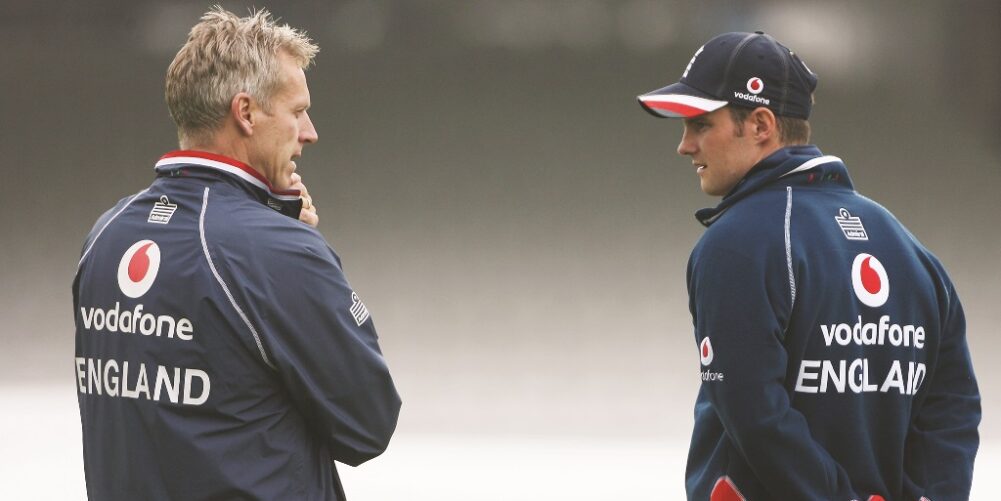By Peter Hayter
With England preparing to depart West Indies after completing their winning ODI series, it is unlikely much attention will have been paid to the imminent arrival of the man who was running them the last time they visited the islands.
In his new life as head coach at Nottinghamshire, Peter Moores will be overseeing the club’s pre-season preparation in Barbados and it is fair to speculate that he might have been experiencing mixed emotions as their plane landed at Grantley Adams International Airport.
For while the Caribbean sun is what the doctor would order for most, Moores will be revisiting the place where, in May 2015, his slim chance of extending a second stint as England coach foundered on a Test defeat and shared series against a West Indies outfit described in advance as “mediocre” by his boss, Colin Graves, the incoming ECB chairman.
An ability to retain a dignified silence, not only then but also when first given the boot at the end of 2008, indicates the coach who helped both Sussex and Lancashire to the County Championship is more whinged against than whinging.
Meanwhile, in the two years since his sacking by Andrew Strauss, the former skipper’s first act on taking on the role of director, England Cricket, the feeling has grown that Moores’ failure to live up the tag of “the outstanding coach of his generation” was less about lack of ability than sheer bad timing.
Even those who backed Strauss’ decision agree Moores possesses admirable personal and professional qualities.
As a bloke, the adjective most used to describe the former county keeper was, and is, “decent”. He is also passionate and driven and, while his Tiggerish enthusiasm may have been bruised by experiences with the national side, it remains inextinguishable. The vast majority of international players in his charge stressed just how supportive he was of them and they of him.
As a tactical coach, he was unfairly lampooned as a number cruncher, never more so than following his onfield radio interview in the aftermath of the defeat to Bangladesh in Adelaide, which confirmed England’s exit from the 2015 World Cup.
“We thought 275 was chaseable. We’ll have to look at the data,” he was reported as saying.
What he actually said was “we’ll have to look at that later”, but the damage had been done and a letter of apology from the BBC for their genuine error of transcription was never going to be enough to undo it.
It must be said that the testimony of captains he worked with does not totally contradict the idea that Moores was better at theory than practice, and Kevin Pietersen and Strauss have voiced that opinion in their autobiographies, the latter somewhat more gracefully than the former, of course.
Both agreed that a lack of first-hand and successful experience of playing international cricket was critical in this regard. To balance that, few would argue that Andy Flower’s opinion deserves respect and such was the high regard he held for the man who appointed him as assistant coach that when Moores was sacked first time round following Pietersen’s failed coup, Flower only agreed to take over after having cleared it with his predecessor.
“I wasn’t sure I wanted to step into Peter’s shoes.” Flower recalled. “I respect the guy a lot and he taught me a lot.”
Moores knows he made mistakes, some of them howlers, but when it comes to picking players, it is hard to argue against the proposition that he did as much right than wrong and possibly more.
Appointed in the aftermath of England’s disastrous Ashes defeat in 2006-07, he realised new blood was needed, even though effectively dismantling the 2005 winning side was going to be painful and probably highly unpopular. He knew he wanted his players to be sharper and fitter and stronger and that meant all of them.
He also knew risks would have to be taken when backing his judgment over players others had not fancied.
Taking the new ball from the hands of Matthew Hoggard and Steve Harmison and throwing it to James Anderson and Stuart Broad on the 2007-08 tour to New Zealand was more about natural progression.
But giving Ryan Sidebottom a proper go in Tests where previous coach Duncan Fletcher seemed only to be interested in pacemen who could hit 90mph, was a brave and successful call.
Bringing Graeme Swann out of county cricket and the personal doldrums that caused the off-spinner to question his future in the game was an inspired move. Ditto, backing Matt Prior to transform himself from a batsman who kept wicket to the world’s best wicketkeeper/batsman.
But the feathers of some senior players were ruffled in the process of change, including those of Pietersen who spent much of the ill-fated 2008 tour to India trying to elicit support for a change of coach, then presented the management with what amounted to an ultimatum to that effect.

That they sacked Pietersen as captain but not as a player, while dismissing Moores flat, does not reflect well on the decision-makers, and the fact that England won the 2009 Ashes and took the No.1 spot in Test cricket with Anderson, Broad, Prior and Swann at the heart of their success is surely not coincidental.
“We needed to change,” Moores explained later, “and I look back and think, yes, in my enthusiasm, I pushed too hard. You should allow that to happen. I wanted them to be fitter and, yes, you can push too hard.”
When appointed for the second time in April 2014 it was once again to start a rebuilding job, post-Ashes thrashing, post KP, post Swann and post Prior.
Once again he backed his judgment, primarily over Joe Root, who had been dropped during the disaster Down Under.
And while other picks were less successful, the new England captain is in no doubt as to how vital that support was. “He was brilliant,” said Root who credited the coach for “knowing how to get the best out of me” and for his “drastic improvement”.
The fallout from Pietersen‘s sacking refused to subside, the form and confidence of his captain Alastair Cook suffered and eventually, battered by the criticism that followed England’s terrible 2015 World Cup and for failing to put away West Indies soon afterwards, it was Moores who found his neck on the block again.
Many would argue Moores has never been quite up to the task of leading international cricketers in international cricket and won’t be persuaded otherwise.
Yet, after the spirit of adventure he had tried to implant in them with the help of No.2 Paul Farbrace finally took root, in ODI cricket first then, in their brilliant Test win in South Africa, the nagging feeling remains that, once again, Moores might have paid the price for being in the right job at the wrong time.















